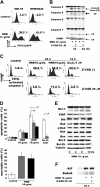Honokiol overcomes conventional drug resistance in human multiple myeloma by induction of caspase-dependent and -independent apoptosis
- PMID: 15870175
- PMCID: PMC1895215
- DOI: 10.1182/blood-2005-01-0346
Honokiol overcomes conventional drug resistance in human multiple myeloma by induction of caspase-dependent and -independent apoptosis
Abstract
Honokiol (HNK) is an active component purified from magnolia, a plant used in traditional Chinese and Japanese medicine. Here we show that HNK significantly induces cytotoxicity in human multiple myeloma (MM) cell lines and tumor cells from patients with relapsed refractory MM. Neither coculture with bone marrow stromal cells nor cytokines (interleukin-6 and insulin-like growth factor-1) protect against HNK-induced cytotoxicity. Although activation of caspases 3, 7, 8, and 9 is triggered by HNK, the pan-caspase inhibitor z-VAD-fmk does not abrogate HNK-induced apoptosis. Importantly, release of an executioner of caspase-independent apoptosis, apoptosis-inducing factor (AIF), from mitochondria is induced by HNK treatment. HNK induces apoptosis in the SU-DHL4 cell line, which has low levels of caspase 3 and 8 associated with resistance to both conventional and novel drugs. These results suggest that HNK induces apoptosis via both caspase-dependent and -independent pathways. Furthermore, HNK enhances MM cell cytotoxicity and apoptosis induced by bortezomib. In addition to its direct cytotoxicity to MM cells, HNK also represses tube formation by endothelial cells, suggesting that HNK inhibits neovascurization in the bone marrow microenvironment. Taken together, our results provide the preclinical rationale for clinical protocols of HNK to improve patient outcome in MM.
Figures






Similar articles
-
Novel inosine monophosphate dehydrogenase inhibitor VX-944 induces apoptosis in multiple myeloma cells primarily via caspase-independent AIF/Endo G pathway.Oncogene. 2005 Sep 1;24(38):5888-96. doi: 10.1038/sj.onc.1208739. Oncogene. 2005. PMID: 15940263
-
Liposomal honokiol inhibits non-small cell lung cancer progression and enhances PD-1 blockade via suppressing M2 macrophages polarization.Phytomedicine. 2024 Dec;135:156093. doi: 10.1016/j.phymed.2024.156093. Epub 2024 Sep 24. Phytomedicine. 2024. PMID: 39531934
-
FTY720 induces apoptosis in multiple myeloma cells and overcomes drug resistance.Cancer Res. 2005 Aug 15;65(16):7478-84. doi: 10.1158/0008-5472.CAN-05-0850. Cancer Res. 2005. PMID: 16103102
-
Honokiol targets mitochondria to halt cancer progression and metastasis.Mol Nutr Food Res. 2016 Jun;60(6):1383-95. doi: 10.1002/mnfr.201501007. Epub 2016 May 6. Mol Nutr Food Res. 2016. PMID: 27276215 Review.
-
Honokiol analogs: a novel class of anticancer agents targeting cell signaling pathways and other bioactivities.Future Med Chem. 2013 May;5(7):809-29. doi: 10.4155/fmc.13.32. Future Med Chem. 2013. PMID: 23651094 Review.
Cited by
-
Novel Delivery Systems of Polyphenols and Their Potential Health Benefits.Pharmaceuticals (Basel). 2021 Sep 22;14(10):946. doi: 10.3390/ph14100946. Pharmaceuticals (Basel). 2021. PMID: 34681170 Free PMC article. Review.
-
Protective effect of berberine against oxidative stress-induced apoptosis in rat bone marrow-derived mesenchymal stem cells.Exp Ther Med. 2016 Dec;12(6):4041-4048. doi: 10.3892/etm.2016.3866. Epub 2016 Nov 3. Exp Ther Med. 2016. PMID: 28101183 Free PMC article.
-
Small mitochondria-targeting molecules as anti-cancer agents.Mol Aspects Med. 2010 Feb;31(1):75-92. doi: 10.1016/j.mam.2009.12.003. Epub 2009 Dec 6. Mol Aspects Med. 2010. PMID: 19995573 Free PMC article. Review.
-
Potential of plant-derived natural products in the treatment of leukemia and lymphoma.Curr Drug Targets. 2010 Jul;11(7):812-22. doi: 10.2174/138945010791320809. Curr Drug Targets. 2010. PMID: 20370646 Free PMC article. Review.
-
Biodegradable polymeric micelles coencapsulating paclitaxel and honokiol: a strategy for breast cancer therapy in vitro and in vivo.Int J Nanomedicine. 2017 Feb 23;12:1499-1514. doi: 10.2147/IJN.S124843. eCollection 2017. Int J Nanomedicine. 2017. PMID: 28260895 Free PMC article.
References
-
- Taira J, Ikemoto T, Mimura K, Hagi A, Murakami A, Makino K. Effective inhibition of hydroxyl radicals by hydroxylated biphenyl compounds. Free Radic Res Commun. 1993;19(suppl 1): S71-77. - PubMed
-
- Teng CM, Chen CC, Ko FN, et al. Two antiplatelet agents from Magnolia officinalis. Thromb Res. 1988;50: 757-765. - PubMed
-
- Clark AM, El-Feraly FS, Li WS. Antimicrobial activity of phenolic constituents of Magnolia grandi-flora L. J Pharm Sci. 1981;70: 951-952. - PubMed
-
- Chang WS, Chang YH, Lu FJ, Chiang HC. Inhibitory effects of phenolics on xanthine oxidase. Anticancer Res. 1994;14: 501-506. - PubMed
-
- Kuribara H, Stavinoha WB, Maruyama Y. Behavioural pharmacological characteristics of honokiol, an anxiolytic agent present in extracts of Magnolia bark, evaluated by an elevated plus-maze test in mice. J Pharm Pharmacol. 1998;50: 819-826. - PubMed
Publication types
MeSH terms
Substances
Grants and funding
LinkOut - more resources
Full Text Sources
Other Literature Sources
Medical
Research Materials

